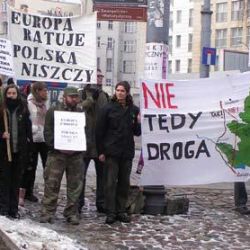On 10 February 2007 the President of the European Commission Jose Manuel Barroso paid a one-day visit to Warsaw. Dariusz Szwed, one of the chairmen of the Polish Greens Party 2004, learned about the visit one day earlier from a dispatch by the Polish Press Agency. He decided to organise a picket "Against building a motorway in the Rospuda Valley", the aim of which would be drawing attention to the issue of the motorway planned to be built through the Rospuda Valley. About 70 people came to the assembly in front of the Presidential Palace.
Dariusz Szwed was charged of organising and presiding over an unlawful assembly (article 52 § 1 of the Petty Offences’ Code). The Court questioned whether article 52 § 1 point 2 of the Petty Offences’ Code is in accordance with article 57 of the Constitution of the Republic of Poland and article 11 of the Convention for the Protection of Human Rights and Fundamental Freedoms, in so far as it penalises the organisation of a spontaneous assembly without a necessary notification or presiding over a spontaneous assembly, that is, a gathering that could not have been reported in advance due to circumstances beyond the control of the organiser, and when organising the assembly on another date would be aimless or have little influence in terms of a public debate.
According to the Court, this article, in so far as it penalises the organisation of a spontaneous assembly, violates the constitutional right to gather. Regarding that, the Court turned to the Constitutional Tribunal with a legal question. The Constitutional Tribunal, examining the legal question of the Court, in a verdict of 10 July 2008 (P 15/08) decided that article 52§ 1 point 2 of the Petty Offences’ Code is congruent with article 57 of the Constitution of the Republic of Poland. In the justification, the Constitutional Tribunal pointed to the fact that in view of the instruments provided by the Petty Offences’ Code, there is a possibility of interpreting and applying the questioned regulation in accordance with the Constitution. That’s because on every stage of the proceedings, the Court establishes whether the act has any features of an offence at all, next – whether the action is injurious to the public, and at last – whether the person subject to the punishment bears the blame for their action. The degree of fault determines the punishment.
According to the Constitutional Tribunal, there is a possibility of interpreting and applying the questioned regulation in accordance with the Constitution of the Republic of Poland. The fact that the laws concerning assemblies do not single out the category of "spontaneous assemblies", does not exclude the idea of working out a special approach to particular actions, which, taking into account the degree of injuriousness of an action and of the element of fault, would not lead to the restriction of the constitutional right to gather through punishing all organisers (leaders) of all gatherings (without notifications). On the contrary, the obligation of immediate application that results from the Constitution (article 8 paragraph 2), means that the court, dealing with an offence from article 52 §1 point 2 of the Petty Offences’ Code, is obliged to assess the unlawfulness (social noxiousness of an act) and the fault. Assuming that there is an obligation of informing proper organs about an assembly, the Tribunal decided that not satisfying this requirement does not automatically make the organiser, or the person that presided over the assembly, responsible. The role of the court is to decide whether, in given circumstances, there was an objective possibility of informing about an assembly and, in consequence, whether there is any basis for punishing the accused person.
The court took the indications of the Constitutional Tribunal contained in the verdict of 10 July 2008 into consideration. According to the Court, the action of the accused has no features of a social noxiousness. His behaviour, rationale, aim and motivation deserve approbation, not punishment. The aim of the assembly was the protection of an important public interest and the protection of the environment through saving the Rospuda Valley, while the protection of the environment is one of the fundamental values protected by the Constitution of the Republic of Poland. The behaviour of the accused caused no harm. He only failed to fulfil the obligation of informing the proper organs of administration within three days preceding the planned assembly. In regard of the time gap between the moment the information about the visit of J.M. Barroso reached D. Szwed and organising the assembly, it was impossible to fulfil this obligation. Taking the above circumstances into account, the Court found Dariusz Szwed not guilty, as he did not exhaust all the features of the offence defined by article 52 §1 point 2 of the Petty Offences’ Code.
A question arises: what are the results of the verdict in D. Szwed case? Undoubtedly, courts should interpret the The Assembly Act with respect to the verdict of the Constitutional Tribunal. However, from a practical point of view, it would be much better to change the Assembly Act, which does not include the category of "spontaneous assembly", and requires the organisers of every assembly of more than 15 people to inform the organs of administration about the gathering. Therefore, it should be expected that the Ministry of Internal Affairs and Administration will take a legislative initiative and prepare an amendment to the act, especially now that it is required in regard to the verdict in Bączkowski and Others v. Poland case anyway.
The case (signature IV W 1792/07) was covered by the Strategic Litigation Programme of the Helsinki Foundation for Human Rights. D. Szwed was represented pro bono by Katarzyna Woroszylska Attorney at Law.
Adam Bodnar, Dorota Pudzianowska
Translation: Michał Urbański





